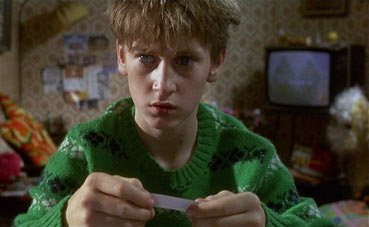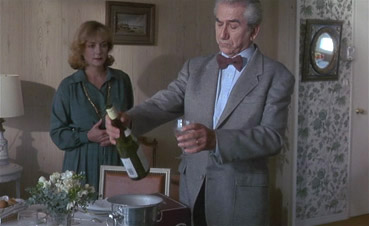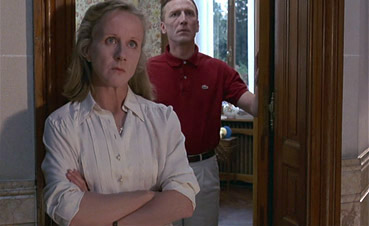|
Life is a Long Quiet River has at its centre an interesting premise. One person, emotionally wounded and deeply bitter, decides to perform an unnoticeable crime that will hurt as many people as possible – people she loves, people she hates, people doesn't know, and people only a couple of minutes old. The crime is such that its repercussions ferment as the years go on, giving this person significant power over the people that she's decided deserve this treatment. What a fascinating character study this could be: someone who could instantly create chaos in the lives of two families, or let the secret bubble on, its intensity growing stronger. That's not what we get in this film, not by a long way. Whilst that's not necessarily a bad thing, it highlights the main reason why Life is a Long Quiet River doesn't work: the set-up and pay-off of the plot are completely divorced from one another.

Nurse Josette has planned to spend Christmas Eve with her adulterous lover Dr Mavial. On the night in question obstetrician Mavial successfully oversees the delivery of two babies; one born to the impoverished Groseille family and the other to the wealthier Le Quesnoys, with whom Mavial is friends. At the last minute Mavial ditches Josette in favour of attending a Christmas party with his wife and Josette swears to make everyone involved pay. She goes to where the newborns are sleeping and swaps their identities. Twelve years later, again rejected by Mavial, Josette reveals all in an angry letter to her ex-lover. Momo is adopted by the Le Quesnoys, who also insist on keeping hold of Bernadette. However, Momo's criminal habits die hard, Bernadette becomes slightly unhinged when she learns the news of her true lineage, and the upstanding, Christian, Le Quesnoy household becomes ripe for anarchy.
So for the first 30 minutes you'd be forgiven for thinking this was Josette's story – or at least, Josette and Mavial's story. Their part in the proceedings is certainly emphasized, with Mavial as a disinterested but smooth alcoholic quack (who can produce a bottle of wine from seemingly anywhere, and keeps one in the fridge in his operating room) half-heartedly juggling his shut-in wife with the overbearing and needy Josette. An incredibly wooden performance from Daniel Gelin aside, these early scenes are pretty good. Catherine Heigel merits special mention as Josette, portraying the character's desperation perfectly, and appearing as if she bears the weight of years worth of ill treatment from the Doctor. This first half is also the only time in the film that there's any comedy that actually works (the gag with the cooking chickens raises a chuckle) as we watch Mavial go through the motions with Josette, whilst she makes an effort to keep the affair alive.
Then, suddenly, everything changes. Josette and Mavial disappear from the narrative altogether once their affair is ended. Josette writes the scathing letter, revealing the switching of the babies and then the two characters vanish from the film. The story then focuses on the story of Momo's adoption by the Le Quesnoys, and it all suddenly becomes a lot less interesting: as if the two parts of the film are entirely separate entities. Why Josette does chose to revenge herself on these two families? Did she know them before? It doesn't make a lot of sense.

Neither does what happens afterwards. The moral dilemma facing both families is dealt with relatively quickly – the Le Quesnoy's effectively buy Momo, and the Groiselles don't seem to care either way. Suddenly, we find ourselves amongst characters we haven't really been introduced to properly – despite some early scenes. Both families are a bit short-changed once the plot proper actually begins because of the early focus on Josette and Mavial. It doesn't help that there are so many characters to juggle – both families are large mobs, and there are several other supporting parts thrown into the mix, and it sometimes feels as if the script is overcrowded. Likewise, there's a thick brush being used with these characterizations. The treatment of the suburban poor Groiselle family deserves mention as being decidedly uncomfortable – they are uniformly lazy, shallow, crass and all apparently dependent on the twelve-year old Momo for their income. They also level a number of racist jibes at the Algerian shop owner Hamed, who for a while is the only likeable character in the film. The Le Quesnoys don't come off much better, being repressed, elitist, tasteless, and like the Groiselles, racist. The film's erstwhile protagonist Momo (played very well by Benoit Magimel) is meant to be a loveable scamp but comes across as exploitative and cruel, particularly in his treatment of Bernadette (again, another good child performance). Momo slowly begins to introduce his wastrel brothers and sisters to the upstanding Le Quesnoy kids, and as the latter family begins to vapourize thanks to introduction of Groiselle anarchy, what is supposed to be liberation for the kids feels more like degeneration.
Besides the dubious characterization, the plot is plodding and aimless, with jokes that are few and far between, and when they do arrive barely raise a snigger. There is some nuance amongst it all though, and there is a nod towards subtlety with the hinting of the children's true lineage. Bernadette wants to be a singer and is obsessed with hair and make up, much like her real mother Mrs Groiselle; just like Momo's financial acuity betrays the fact that he is really a Le Quesnoy. The set design and location work is also very striking, and has a dirty authenticity; the Groiselle's flat looks genuinely grimy, with empty beer bottles and old fag ends everywhere, and a scene where the kids go swimming in an abandoned dock is salient. However, the garish 80s fashion, and cinematography that fills the rooms full of half-shadow – like being trapped in a Victorian terrace house on a sunny day – adds to the general discomfort of viewing the film. This is not a feast for the eyes.

There's an important scene midway through the film, that really encapsulates the problems with Life is a Long Quiet River. Momo's mother (not even named in the film), when introducing the young boy to his real father, simply beckons to the stranger and mutters 'here is your father'. Due to the bad performances, shabby look and the story's disconnectedness, it's unclear whether or not moments like these are designed to induce horror, laughter or both. In the end, we don't get either.
A pretty good anamorphic 1.66:1 with even contrast and a pleasant, pastel colour palette. The image is sharp enough but picks up a degree of digital noise when upscaled and even looks a little drab in places. Good but not a standard setter.
The Dolby stereo 2.0 track is clear but with little frontal separation and nothing to show off the sound system.
The Trailer (00:36) is quirky and different, featuring an original sketch entirely divorced from the film itself. No spoilers here, but it's worth a look.
Artificial Eye have also included promos for upcoming releases: Waltz With Bashir, Let's Talk About the Rain and The Wind Will Carry Us.
The subtitles on the disc are complete and unobtrusive.
Life is a Long Quiet River isn't a pleasant viewing experience. It's not particularly funny, none of the characters are likeable, there are wooden performances all round and the fracture in the plot is hard to get over. I understand that the film has big cultural resonance in France thanks to regular TV repeats – this disc is fine for those who already know and like the film, but those who haven't seen it probably shouldn't invest.
|